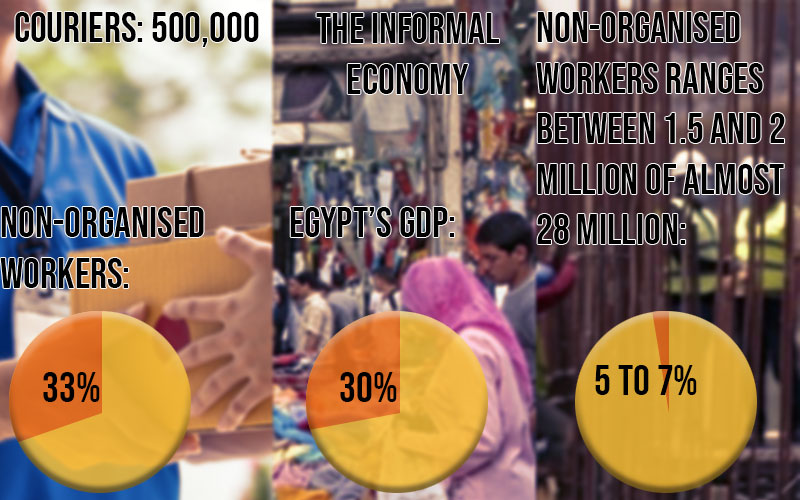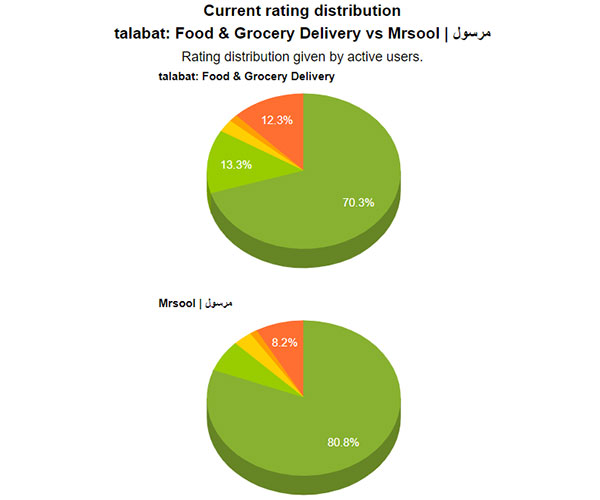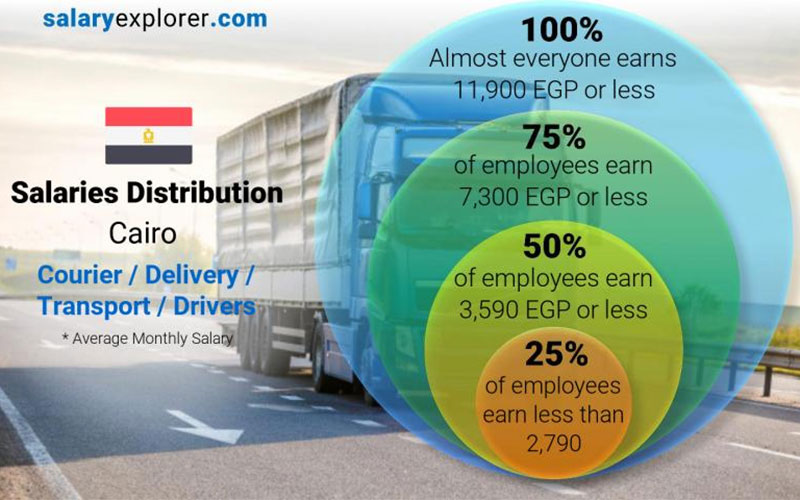Egypt’s home delivery workers: Toward integration in the formal economy?
Doaa A.Moneim , Saturday 30 Jul 2022
Tens of thousands of Egyptians who work as home delivery couriers – known in Arabic as tayareen, or pilots – face hard working conditions and enjoy minimal social protections.

Ahram Online attempted to obtain official figures from the concerned ministries, the International Labour Organisation and the Central Agency for Public Mobilisation and Statistics (CAPMAS), to determine the number of home delivery couriers operating in the country, yet the concerned authorities had no clear figures in this respect.
However, an examination of the databases of a number of home delivery applications suggests that home delivery couriers working in Egypt could exceed 500,000, which is about one-third of the country's irregular workers.

Home delivery workers usually work 12-hour shifts without health insurance or pensions and cannot rely on a stable income.
Many couriers work through registering on a database for various online home delivery platform applications without entering into a direct contractual relationship with the business owner.
These app couriers receive between 10 to 20 percent as a commission per order and rely heavily on tips, according to Sayed El-Aasmar and Mohamed El-Tayar, two couriers who spoke to Ahram Online.
They use their own motorcycles or means of transportation in their delivery work, paying for gasoline and repairs.
Many are now trying to improve their wages and living conditions, and there are initiatives to organise and integrate them into the formal economy.
Through its socio-economic development plan for the current FY2022/23, which started on 1 July, Egypt’s House of Representatives has urged the concerned bodies to implement a number of procedures that would protect the rights of non-organised and informal workers.
The House called for issuing a practice-of-profession licence for these workers, including them under the social protection umbrella, facilitating their inclusion in the formal economy, and providing them with training to develop their skills.
Amid challenging economic conditions brought about by the Ukraine war, 12,000 couriers working for Talabat – an online food ordering company – went on a two-day strike in April to demand higher wages.

A number of recent initiatives by the Ministry of Social Solidarity and Egyptian Trade Union Federation aim to ensure representation for this category of workers, especially since the online shopping and ecommerce market is expected to grow even larger.
According to Statista, Egypt is the second largest market for online shopping in Africa after South Africa.
Media outlets reported after the Talabaat strike that the government is considering creating a trade union to represent home delivery workers to guarantee them the rights available to other workers.
Mirvat Sabreen, the assistant to the social solidarity minister, revealed to Ahram Online that the ministry has received a proposal to cooperate with a number of online applications to promote the rights of couriers.
Sabreen also said that the ministry is set to sign a number of cooperation protocols with these applications in this regard, without providing further details.
A source at the social solidarity ministry told Ahram Online that the ministry's initiative involves putting in place a framework that governs home delivery services in Egypt, protecting workers' rights as well as holding them to a system of accountability.
“The ministry is working on an initiative that will be sponsored by a number of online shopping applications that are operating in the local market," the source said.
"This initiative includes founding an association that will be affiliated with the ministry and will represent home delivery workers, engaging them in the formal economy."
The source added that the initiative also involves supplying delivery workers with helmets and other protective gear to protect them against traffic accidents.
"It also involves issuing insurance policies against accidents in collaboration with a life insurance company in Egypt. The initiative also involves collaboration with leasing companies to enable couriers to purchase their needs in instalments,” the source explained.
The initiative, which will be implemented in phases, also involves providing couriers with training and awareness sessions, according to the source.
The delivery service Mrsool Egypt, which has 140,000 couriers registered in its system, is one of the online platforms engaged in this initiative and supports all its components.
Mrsool’s Country Manager Karim Gamal told Ahram Online that the platform aims to increase its couriers to 1 million over five years, as the home delivery market in Egypt is growing significantly.

Courtesy of elluminati website.
“As an online platform that also focuses on developing home delivery applications, Mrsool is involved in the process as a focal point between the couriers and the application's users. Recently, these workers have called for social and insurance protection in the face of the risks they encounter on a daily basis. We support creating an entity to represent them, preserve their rights and govern their relationship with business owners and consumers,” said Gamal.
Mrsool provides technical assistance to couriers around the clock, gives bonuses for peak and non-peak times, and it is currently working on fresh business verticals to increase sales, so couriers can increase their monthly income, according to Gamal.
“We support establishing an entity to represent couriers and provide them with medical and social insurance, especially since they are not employees with signed contracts. In addition, this entity will be an important reference for companies themselves with regards to accountability, and can serve as a system that can tally the number of workers, easing the process of dealing with their needs and facilitating support from formal bodies,” Gamal explained.
Ahram Online also spoke to Chairman of the Egyptian Trade Union Federation (ETUF) Hassan Shehata on the issue of establishing a trade union for these kinds of non-organised workers.
Shehata said that such a move would be complicated and that the ETUF is not the body concerned with taking such a measure.
“According to the law governing trade unions, home delivery men can submit a request to the ETUF signed by at least 50 of them to establish an administrative committee that could grow in the future into a trade union committee, then into a trade union representing them in their dealings with business owners and governmental bodies,” Shehata explained.
The International Labour Organisation (ILO), through its office in Egypt, is also working on a comprehensive project to support non-organised workers in Egypt with a focus on the home delivery market.
Mahmoud Agmean, an advocate before the Egyptian Court of Cassation and legal advisor for the ILO, told Ahram Online that this segment of workers lacks an organised legal structure within which to work.
“Companies use these couriers without a clear contractual relationship. This is a great shortcoming that needs to be dealt with, especially given the fact that the home delivery market is growing rapidly,” Agmean said.
Agmean explained that a similar crisis had previously faced workers who were seeking work abroad, since there was no legal framework governing the relationship between these workers and their prospective employers. However, the country’s Labour Law has since been amended with an entire chapter regulating this process.
A legal framework, together with establishing a trade union for them, will guarantee representation for home delivery workers in dealing with business owners as well as official bodies, he added.
The total number of non-organised workers in the country is between 1.5 million and 2 million, according to the latest figures published by the Ministry of Manpower and the Central Agency for Public Mobilisation and Statistics (CAPMAS).
The only available official number for organised labour is the total number of state employees, who are estimated at 6 million, according to CAPMAS.

Courtesy of Salaryexplorer website.
According to the Ministry of Planning and Economic Development, the informal economy represents 30 percent of the country's GDP of EGP 9.2 trillion for the current fiscal year.
Also, the latest economic census released by CAPMAS in 2021 puts the number of businesses in the informal sector at 2 million, which employ millions of workers.
No comments:
Post a Comment